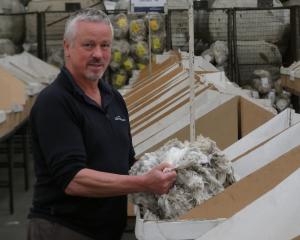
He graduated from the Royal Veterinary College into the 2001 foot and mouth disease outbreak in the United Kingdom and was involved as a field vet at the outset of the response, in which six million cattle, sheep and pigs were slaughtered at a cost of $NZ23 billion.
It was one of the most fundamental things that happened in his career and the effect of such outbreaks had a profound and generational effect on farmers and the agriculture sector generally, he said.
Two decades later, Dr Brownlie — now an experienced veterinary epidemiologist and data scientist living at Taieri Mouth, south of Dunedin — is doing something about it, through the veterinary research company ingenum he founded in 2016.
The result — in collaboration with Qrious, Spark Business Group’s artificial intelligence and data analytics business — was believed to be a world-first solution to predict livestock disease outbreaks using artificial intelligence.
Qrious has developed an early warning system for ingenum that learns the normal season patterns of animal health traits in agricultural data and detects patterns suggestive of new and emerging diseases, and potential outbreaks such as foot and mouth.
Sentinel-AI used artificial intelligence and machine learning to detect anomalies in clinical sign data, such as shivering, bloating and depression, observed in livestock across geographically distributed farms and abattoirs.
The solution would help ingenum to identify notifiable disease in livestock and help veterinarians, agritech and governments respond faster to disease incursions with the aim of minimising the size of the potential outbreak and the significant cost of controlling an outbreak.
The sooner a disease was diagnosed, the less time it had to spread, meaning a smaller response was required, Dr Brownlie said.
The data came from government agencies, veterinary practices and agritech companies that routinely measured the quality of final products, such as milk composition.
The starting point for Dr Brownlie’s interest came from the early stages of his career in veterinary practice. Like many other production animal vets, he would often stand in a paddock or yard "quite isolated", trying to understand what was going on with the animal he was looking at, and pondering whether what he was seeing was part of a much larger problem.

He built a pilot version of Sentinel in 2018 for Australia which taught him an "enormous amount" but he also realised that what he could do, as an epidemiologist, was not going to be sufficient.
With support from Callaghan Innovation, he was able to collaborate with Qrious to develop Sentinel-AI. It was now launching in New Zealand and there were plans to take it global.
Qrious spokesman Christopher Laing, who was raised in Dunedin, said the technology would transform biosecurity monitoring infrastructure, changing it from a very slow process into something sophisticated and real-time.
It was almost like it was "watching over New Zealand" all the time; unlike a human, it did not sleep, go on holiday, or get bored, he quipped.
Billions of dollars were at risk if something like food and mouth made its way to New Zealand.
What ingenum was doing was not just affecting vets and farmers; it was preserving New Zealand’s economic footing and also social fabric. The likes of foot and mouth would be much more devastating than Covid-19, he said.
Dr Brownlie consults for the Food and Agriculture Organisation of the United Nations, facilitating foot and mouth training for frontline veterinarians in Australia. Foot and mouth was recently found in Indonesia, including Bali.
When it came to Sentinel, Dr Brownlie said he had been trying to escalate the idea since 2017-18. Now stakeholders were starting to engage which was really exciting, and he hoped more would come on board.
It was not about replacing vets; it was about bringing together various data streams, and "giving them something in their pocket", he said.
That meant that those on the front line, whether farmers or vets, were no longer quite as alone as they stood in that paddock, or yard, by themselves.














